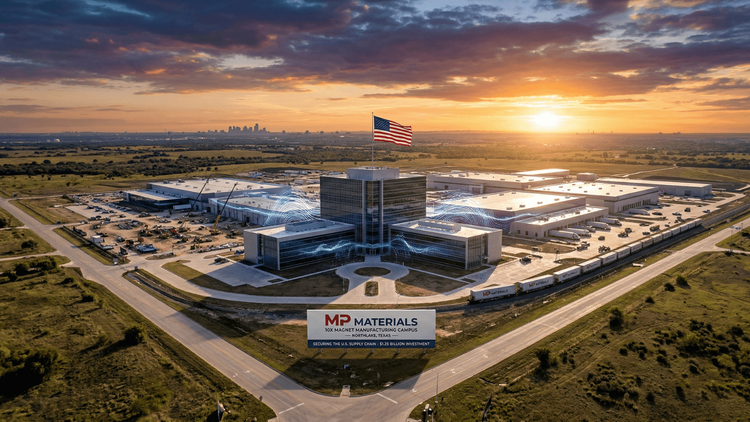Why America’s Future Runs on a Mineral You’ve Never Heard Of
America’s fight for mineral independence takes center stage as China weaponizes antimony supply chains, triggering a geopolitical showdown.

Few Americans have heard of antimony, yet this overlooked mineral is at the heart of modern infrastructure, military technology, and national security. It is a critical component of starter batteries, ammunition, night vision goggles, and flame retardants—all essential to both civilian life and military readiness. The problem? The United States has no domestic production of antimony, leaving the country completely reliant on foreign suppliers.
That reliance became a national security emergency on December 3, 2024, when China imposed a blanket ban on exporting antimony to the United States. The impact was immediate: within 24 hours, antimony prices soared by 40%, driving up costs for manufacturers and threatening supply chains.
This wasn’t just an economic shock—it was a strategic warning. Beijing has long controlled over half of the world’s antimony supply, and by cutting off exports, it signaled its willingness to hold America’s economy and defense industry hostage.
Why Is Antimony So Important?
No antimony means no starter batteries. Every gasoline and diesel-powered vehicle in America relies on lead-acid starter batteries that contain antimony. From cars and trucks to heavy machinery and backup power systems, this one mineral is indispensable.
For the U.S. military, the stakes are even higher. Antimony is a crucial ingredient in armor-strengthened alloys, military-grade ammunition, and advanced optical technology like night vision goggles. Without a reliable supply, America’s warfighters are at risk of losing access to critical equipment.
Yet, despite its importance, America produces zero antimony. The nation’s only known reserves are years away from full-scale production. Even when operational, domestic mining would only meet 40% of national demand, leaving the U.S. vulnerable to future supply shocks.
The Greenland Factor: A Strategic Goldmine
President Trump’s recent focus on strengthening America’s relationship with Greenland has surprised many political observers. After all, Greenland was rarely mentioned during the campaign. However, this move is no random geopolitical play—it’s a calculated step toward securing America’s critical minerals, especially antimony.
Greenland is home to 25 of the 34 minerals deemed essential by the U.S. Defense Department. Among them, antimony stands out. A major antimony deposit was discovered in Greenland in November 2024, immediately raising concerns about whether China would attempt to secure rights to these resources.
Trump’s renewed interest in Greenland immediately followed this discovery, underscoring the urgency of securing access before China can move in. If Beijing succeeds in acquiring Greenland’s antimony, the U.S. could face permanent dependence on a hostile foreign power for one of its most crucial industrial minerals.
China’s Playbook: Controlling the World’s Minerals
China’s dominance in critical minerals is not accidental. For decades, Beijing has employed a deliberate, multi-step strategy:
- Market Manipulation – China floods the global market with cheap, subsidized minerals to bankrupt competitors.
- Strategic Acquisitions – Once foreign mines shut down, China buys up mineral rights, locking in supply control.
- Supply Cuts – Once dominance is achieved, China restricts exports, forcing nations like the U.S. to comply with its terms or pay exorbitant prices.
The December 3 antimony export ban was just the latest move in this playbook. The message from Beijing was clear: China controls the world’s critical minerals, and the U.S. is at its mercy.
The Trump-Monroe Doctrine: Blocking China’s Expansion
To counter China’s mineral aggression, President Trump has introduced a modern Trump-Monroe Doctrine, ensuring that critical resources in the Western Hemisphere remain under U.S. control.
This doctrine echoes the original Monroe Doctrine of 1823, which warned European powers against interfering in the Americas. Today, China—not Europe—is the foreign power seeking to dominate the hemisphere’s resources.
China is already Canada’s second-largest mineral importer, and it has aggressively pursued Latin America’s lithium, copper, and other key resources. The next step in Beijing’s strategy would be to swoop in and secure Greenland’s minerals, cementing its monopoly over the global supply of antimony and other critical elements.
Trump’s swift response—strengthening U.S.-Greenland relations—aims to block China’s advance and ensure that Greenland’s mineral wealth benefits America, not the Chinese Communist Party.
America’s Path to Antimony Independence
In the immediate future, the U.S. will need to source antimony from alternative suppliers such as Tajikistan, Burma, and Bolivia. But this is a short-term fix. A long-term solution requires decisive action:
- Greenland Partnership – Securing agreements with Greenland’s government to directly access its antimony reserves.
- Domestic Production Acceleration – Fast-tracking America’s only known antimony mine to maximize output as soon as possible.
- Closed-Loop Recycling Expansion – The U.S. leads the world in lead-acid battery recycling, recovering over 99% of old batteries. This system can be expanded to reclaim antimony and tin, reducing dependence on foreign suppliers.
A Race Against Time
China’s December 3 antimony ban was not an isolated act. It was a strategic attack on U.S. industry and national security. If the U.S. does not move quickly to secure independent sources, the consequences will be severe.
The ability to manufacture starter batteries, military equipment, and essential technologies hinges on securing a stable, domestic supply of antimony. The stakes couldn’t be higher.
President Trump’s push for a Trump-Monroe Doctrine is a necessary step toward American mineral independence. The U.S. cannot afford to be caught off guard again. With China playing the long game, it’s time for America to act decisively.






